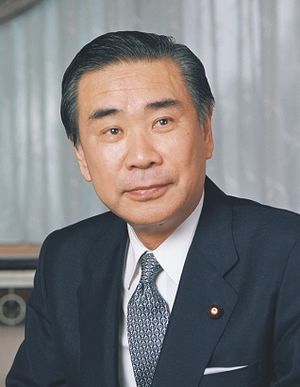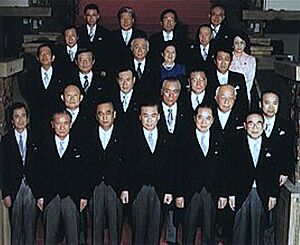Tsutomu Hata facts for kids
Quick facts for kids
Tsutomu Hata
|
|
|---|---|
|
羽田 孜
|
|
 |
|
| Prime Minister of Japan | |
| In office 28 April 1994 – 30 June 1994 |
|
| Monarch | Akihito |
| Preceded by | Morihiro Hosokawa |
| Succeeded by | Tomiichi Murayama |
| Deputy Prime Minister of Japan | |
| In office 9 August 1993 – 28 April 1994 |
|
| Prime Minister | Morihiro Hosokawa |
| Preceded by | Masaharu Kotoda |
| Succeeded by | Yohei Kono |
| Minister of Foreign Affairs | |
| In office 9 August 1993 – 28 April 1994 |
|
| Prime Minister | Morihiro Hosokawa |
| Preceded by | Kabun Muto |
| Succeeded by | Koji Kakizawa |
| Minister of Finance | |
| In office 5 November 1991 – 12 December 1992 |
|
| Prime Minister | Kiichi Miyazawa |
| Preceded by | Toshiki Kaifu Acting |
| Succeeded by | Yoshiro Hayashi |
| Minister of Agriculture, Forestry and Fisheries | |
| In office 27 December 1988 – 3 June 1989 |
|
| Prime Minister | Noboru Takeshita |
| Preceded by | Takashi Sato |
| Succeeded by | Hisao Horinouchi |
| In office 28 December 1985 – 22 July 1986 |
|
| Prime Minister | Yasuhiro Nakasone |
| Preceded by | Moriyoshi Sato |
| Succeeded by | Mutsuki Kato |
| Member of the House of Representatives for Nagano 3rd District Nagano 2nd District (1969–1996) |
|
| In office 27 December 1969 – 16 December 2012 |
|
| Personal details | |
| Born | 24 August 1935 Tokyo, Empire of Japan |
| Died | 28 August 2017 (aged 82) Tokyo, Japan |
| Political party | Democratic Party (2016) (2016–2017) |
| Other political affiliations |
LDP (1969–1992) Renewal Party (1992–1994) NFP (1994–1996) Sun Party (1996–1998) GGP (1998-1998) DPJ (1998–2016) |
| Spouse | Ayako Hata |
| Children | Yuichiro Hata |
| Alma mater | Seijo University |
| Signature | |
Tsutomu Hata (羽田 孜, Hata Tsutomu, 24 August 1935 – 28 August 2017) was a Japanese politician. He served as the Prime Minister of Japan for a short time in 1994. He became prime minister after Morihiro Hosokawa stepped down.
Hata led a coalition government, which means several political parties worked together. However, one major party left the group soon after he became prime minister. This made it hard for his government to continue. He was a member of the lower house of Japan's parliament, representing the Nagano area. He was elected 14 times before he retired in 2012.
Contents
Early Life and Career
Tsutomu Hata was born in Tokyo, Japan, on August 24, 1935. His father, Bushiro Hata, was also a Liberal Democratic Party Member of Parliament.
Hata went to Seijo University. After finishing college, he worked for the Odakyu bus company. He worked there from 1958 until 1969.
Political Journey
In 1969, Hata began his political career. He was elected to the House of Representatives of Japan. This is the lower house of Japan's parliament. He represented the Nagano Prefecture and was a member of the Liberal Democratic Party (LDP).
During the 1980s, he became a very important leader within a powerful group in the LDP. He served in different government roles. In 1991, he became the Minister of Finance, managing Japan's money matters.

In 1993, Hata left the LDP. He started a new party called the Japan Renewal Party with his friend Ichirō Ozawa. This new party joined a group of parties that wanted to form a government without the LDP. Hata then became the Minister of Foreign Affairs in this new government, led by Morihiro Hosokawa.
Becoming Prime Minister
On April 28, 1994, Prime Minister Hosokawa resigned. Tsutomu Hata then became the new prime minister. However, his time as prime minister was very short. The Japan Socialist Party, which was a big part of his government, left the coalition. This meant Hata's government no longer had enough support in the Diet (Japan's parliament).
Instead of facing a vote where he might be forced out, Hata decided to resign. He stepped down in June 1994. This allowed Tomiichi Murayama, the leader of the Socialist Party, to become prime minister on June 30. Hata served as prime minister for only nine weeks.
Important Changes as Prime Minister
Even though his time was short, some important new rules were put in place during Hata's leadership:
- Support for Older Workers: A law was passed on June 17, 1994. It encouraged companies to keep older employees working past age 60. It also made it illegal for companies to force people to retire before age 60.
- Help for Disabled Workers: On June 22, 1994, a special center was created. This center helps disabled workers by giving them advice, job training, and information. It also helps employers who want to hire disabled people.
- Child-Care Leave Benefits: A new health insurance rule was passed on June 29, 1994. It meant that parents on child-care leave did not have to pay National Health Insurance fees.
Later Political Life
After his time as prime minister, Hata continued to be active in politics. His party, the Shinseito, later joined a larger party called the Shinshinto in late 1994. Hata tried to become the leader of this new party but lost.
He then formed another small party called the Sun Party. This party later joined with others to become the Democratic Party of Japan in 1998. Hata remained a key member of the Democratic Party of Japan until 2016. He retired from politics in 2012.
Personal Life and Legacy
Tsutomu Hata's son, Yuichiro Hata, also became a politician. Yuichiro was a member of the House of Councillors, which is the upper house of Japan's parliament. He served as the Minister of Land, Infrastructure, Transport and Tourism in 2012.
Tsutomu Hata was known for promoting a short-sleeve blazer, which he called an "E-cool suit." He thought this would help people stay cool in summer and save energy. This idea showed his early concern for sustainable fashion.
Tsutomu Hata passed away peacefully in Tokyo on August 28, 2017. He was 82 years old.
Honours
 Japan:
Japan:
 Portugal:
Portugal:
 Grand Cross of the Order of Prince Henry (2 December 1993)
Grand Cross of the Order of Prince Henry (2 December 1993)
See also
 In Spanish: Tsutomu Hata para niños
In Spanish: Tsutomu Hata para niños
 | Dorothy Vaughan |
 | Charles Henry Turner |
 | Hildrus Poindexter |
 | Henry Cecil McBay |


